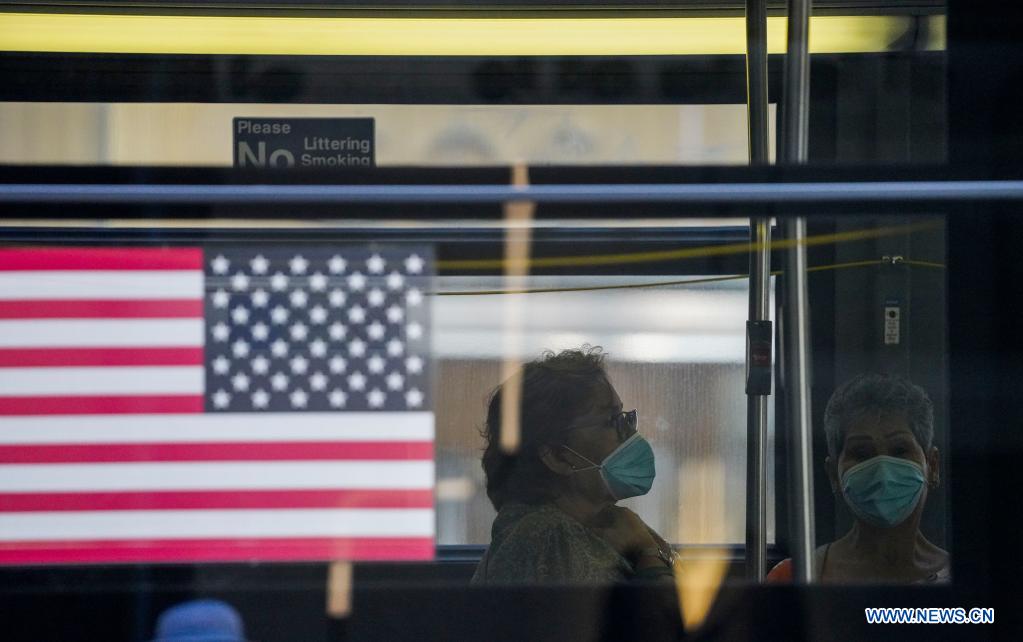?US pandemic complacency, anti-science culture pose grave risks
- By Tom Fowdy
 0 Comment(s)
0 Comment(s) Print
Print E-mail China.org.cn, August 4, 2021
E-mail China.org.cn, August 4, 2021

Despite the United States having initially boasted one of the world's fastest vaccination drives at the start of the year, the highly contagious Delta variant is now running rampant across the country, pushing up daily cases toward an average of nearly 100,000 and deaths pulsing around 400 to 600.
While there is a great deal of debate concerning the efficacy of vaccines against this variant – which do of course reduce the risk of severe illness and death – a key point highlighted by scientists is that the virus is most predominant in areas of American society that have not yet been vaccinated. This shows how political and social divides are undermining the national fight against the virus as a whole.
To few people's surprise, the most vulnerable states being struck by the Delta variant are the deeply Republican and conservative states of the Deep South, including places such as Florida, Texas, Arkansas and Alabama, which have below national average vaccination rates due to social and cultural resistance. For example, only 36.5% of people in Arkansas have been fully vaccinated, compared to 63.4% in the northeastern, progressive leaning state of Connecticut. This has left American authorities scrambling to encourage vaccinations, revealing how the country's chronic anti-science and conspiracy theory laden political culture is now prolonging the tragic loss of life which has already seen 615,000 Americans die in an eyewatering mismanagement of the pandemic.
But why do some people not want to get vaccinated? And why is this more apparent in certain regions of the country than others?
First of all, the United States is a deeply divided and fractured nation along cultural, political and economic lines, suffering from endemic social and income inequality. While the country is symbolized by stunning achievements in science and business, this also coexists alongside immense levels of insecurity and resentment that have exacerbated political instability and unrest as manifested through the presidency of Donald Trump. Those who live in the Deep South may share a country with the wealthy and privileged liberals of New York City, yet they are a world away for all intents and purposes, and these cross-cultural conflicts are increasingly defining America.
This backdrop and the rise of social mass media has led to a proliferation of conspiracy politics across many demographic groups in the U.S. who are concentrated in poorer "left behind areas" and facilitated the rise of "anti-science politics" which rejects vaccines, climate change and many other things as sinister plots aimed at eroding their way of life. It is linked to the American ideals of "classical liberty" which treats all forms of authority with unnecessary cynicism. Long before the pandemic, opposition to vaccines and associated misinformation among these groups was already widespread and entrenched.
The Trump presidency and its supporting media ecosystems only served to amplify these voices and waged an anti-science war against leading medical experts such as Dr. Anthony Fauci. This has played into many domains, including opposition to lockdowns, restrictions and wearing masks, the proliferation of lab leak conspiracies, promotion of bogus cures, and unsurprisingly, an associated rejection of vaccines by some. As a result, while America glorified the pace of its nationwide vaccine rollout, this papered over the cracks of gaping regional inequalities concerning who would take the vaccine and who wouldn't. Some state leaders have been resorting to desperate measures in order to get people vaccinated, even pledging to pay people to take the vaccine.
The rise of the Delta variant is also of course partly down to Washington's complacency. Despite the deep flaws in its vaccine rollout, the U.S. preemptively declared victory on the pandemic, took few precautions and began shifting the bulk of its vaccine orders overseas in order to try and compete with other countries. Leaving its own flank unguarded, the virus has roared back with a vengeance, which will inevitably force the science culture wars back into the heart of U.S. politics.
The situation is a demonstration of bitter social and political divisions that continue to take their toll upon the country's wellbeing and national interest. Trump is only one representation of this problematic social conflict which is continuing to cost lives. The current administration must do everything within its power to urge people to get vaccinated, and even contemplate making it mandatory.
Tom Fowdy is a British political and international relations analyst and a graduate of Durham and Oxford universities. He writes on topics pertaining to China, the DPRK, Britain and the U.S. For more information please visit:
http://91dzs.com/opinion/TomFowdy.htm
Opinion articles reflect the views of their authors, not necessarily those of China.org.cn.
If you would like to contribute, please contact us at opinion@china.org.cn.





